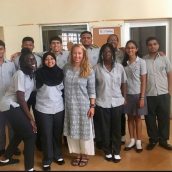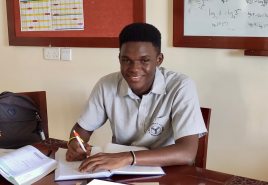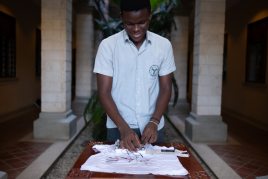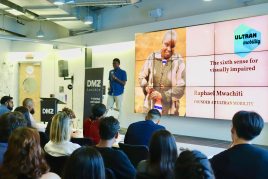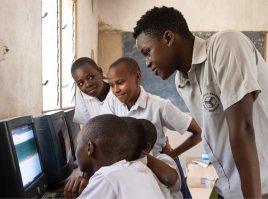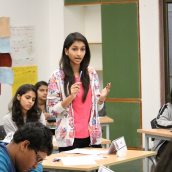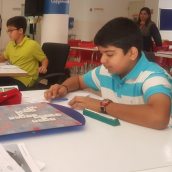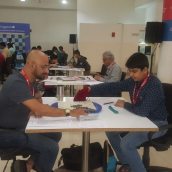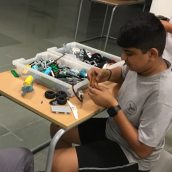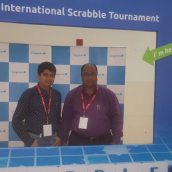Bernardo Arsénio: Inspired teacher with a mission
Bernardo learned from the Aga Khan Academies that knowledge cannot just be seen as something that starts and ends in a classroom, but that knowledge should also be applicable outside the classroom to solve real problems in real life.
Bernardo Arsénio’s journey to becoming a teacher started when he was in year 11 of his school in Maputo, Mozambique. He had a history teacher who used to make fun of him in the classroom. “He used to come to my desk and ask me what I was doing in his class,” Bernardo says. The teacher did that continuously throughout the year. This affected Bernardo’s performance and motivation to be in that class. He failed the class that year.
“But then I realised I could not let him win… I knew that I am supposed to be in class to learn and not to just let someone de-motivate me because he thinks I shouldn’t be there." Bernardo went to talk to his principal who allowed him to attend the class with the same teacher in spite of failing the class. Bernardo later realised that he had to change his attitude if his teacher did not change his. “So I started attending his class – I used to do all the assignments, tests and homework. I never missed even one class in the year,” he says. Bernardo’s constant efforts were noticed by the teacher – Bernardo even achieved the highest mark that year. In turn, the teacher’s attitude towards him changed for the better.
By giving an example from his life, Bernardo explains why a healthy relationship between a teacher and a student is so important. Having a teacher who does not care and does not motivate the students can have negative consequences. “It almost happened to me and I did not let it happen. I used the negative motivation to change it into a positive one – that inspired me to become a teacher,” he says vehemently.
Bernardo pursued History at Eduardo Mondlane University in Maputo. After graduating with a degree in History and a minor in Information Management in 2015, Bernardo began teaching history in a private school – Centro de Exames de Admissão. Desiring even more teaching skills, Bernardo took a six-month postgraduate course in 2016 at Universidade Pedagógica, specialising in teaching methodology.
After a rigorous selection process, Bernardo was one of six individuals who were given the opportunity for a year-long exchange at the Aga Khan Academy in Mombasa, Kenya as part of the Teacher Preparation Programme. “I was lucky to be in the group to come to Mombasa. That was when my journey started,” he says. At the Aga Khan Academy Mombasa, Bernardo went through three weeks of intensive English training. He humbly says, “We got support from each and every person in the Academy. To reach this level, for me to be able to communicate and to go to class and discuss a certain topic was all because we got so much help. I was challenged in class and felt I could not do it. When you feel you cannot do it, you think you are drowning but find yourself swimming and coming out of water; it was very meaningful.” Bernardo ended up teaching Humanities and History to students in Grades 6 to 9.
When he came to the Aga Khan Academy Mombasa, the first thing Bernardo noticed was how the students played an important role in their education and how they took the responsibility for their own education. He says, “Back at home, the environment is where the teacher owns the knowledge and dominates the classroom.” He also remembers going to a Theory of Knowledge class at the Academy and noticing how the students did not learn by rote but were encouraged to discuss and make sense of what was being taught. The method by which the class was taught thoroughly impressed him.
At the Aga Khan Academy Mombasa, Bernardo mentions how amazed he was to see such cultural and religious diversity. He took note of the unity with which everyone participated in school, for example by focusing on their similarities instead of their differences. He was also impressed with how sports classes were taught at the Academy, utilised as an opportunity for students to get together and learn about their similarities and differences. Bernardo found the people in Mombasa very warm and friendly and he did not feel far away from home.
Bernardo is now back in Mozambique, teaching at the Aga Khan Academy Maputo. He will continue to be a Humanities and History teacher and is helping support the growth of the Academy as they implement the International Baccalaureate (IB) Middle Years Programme. He strongly feels that a teacher should connect what is being taught to real life. For Bernardo, a teacher must motivate and support the students, and should enable students to develop and become better people.
Shad Bherani: Making the connection between classroom and career
In his final year of the Diploma Programme at the Aga Khan Academy Mombasa, Shad Bherani is ambitious, curious, and driven to become an engineer – or, as he describes himself, “simply one of 7.6 billion people who is passionate to pursue his career.”
Sticking to his motto that “opportunity only comes once,” Shad opted to use his summer vacation last year to bridge the gap between his classwork in the sciences and his calling in mechanical engineering. “I just thought not to sit back at home – to do something for me, for my career,” he says. And so, at home in Karachi, he inquired at the Aga Khan University (AKU) if they might consider taking him, a keen and talented International Baccalaureate (IB) student, as a summer intern through the Academies internship programme.They fortunately agreed – and the placement, Shad’s first professional role, turned out to be a thrilling and fulfilling hands-on learning experience. He spent several weeks working closely with engineers and technicians in the AKU Hospital’s Mechanical, Electrical and Plumbing department. With their supervision and support, Shad learned how to operate the Building Management System, which runs the air conditioning across campus, including filtering air and controlling the temperature of every air conditioning unit. He also came to understand the ins and outs of the campus’s primary, secondary, and tertiary or emergency power sources, which are essential for critical wards in the hospital.
By helping to repair various machines and air conditioning units, assisting with reports and handling secondary power unit operations, Shad applied the theories he had learned in his math, physics and chemistry classes at the Academy to the complex machinery and inner workings of the hospital and university campus.
For Shad, that was the most memorable outcome of his internship: the reward of having his classwork and textbooks come to life in real-world applications. His strongest subject at school is physics, and he gained a new appreciation for the course, as it is arguably “the most important component in mechanical engineering.” Now, he enjoys discussing the class topics and their real-world relevance in more depth with his teacher.
It was also a joy for Shad to find that he could handle the chemical formulas used in filtering atmospheric air, and could understand the mechanics of supply and exhaust fans, chillers and boilers. Shad found that he could confidently approach new, unfamiliar tasks and challenges by combining his previously acquired knowledge with the skills he was developing in practice at the internship.
In addition to applying and developing his technical knowledge and skills, Shad also gained insight into the workforce: “I saw how the ‘official’ world works – the life of a student is different from that of a person who is working!” he reflects. He points out that in the working world, everything is on time, and one of the major transferable skills he has gained from the Academy is the ability to manage his time and meet deadlines while balancing a heavy workload.
And balance, for Shad, is key: “I also got the opportunity to see the other side of engineers working in control rooms – by getting involved in jokes during lunchtime”, he recalls, which he welcomed as a way to relieve the stress of the 10-hour work days. Shad also maintains balance in his school life: despite his continuous deadlines for assignments and university applications, Shad values spending time in activities and service. “The Aga Khan Academy is known for its holistic development…in our enrichment, we do service for other people; we go on adventures, we serve our community.”In this spirit of collaboration and service, Shad aspires to use his education and career as an engineer to give back and to serve his country and its people, by assisting in Pakistan’s development through technology.
Shad’s inspiring internship renewed his motivation to keep working towards those goals. “Before, I didn’t actually know what will happen in my career,” he says. “But now, I know how I’ll be working, after my undergrad, if I pursue that career.” As he looks ahead and plans for that academic and professional journey, he is keeping his options open: “I’ve already applied to universities worldwide.”
The internship at AKU exceeded all Shad’s expectations and instilled a stronger sense of self-confidence. He especially appreciated being encouraged to undertake tasks normally handled by engineers, and to be an integral part of the team. “My supervisor was impressed with me,” he says proudly. “He told me that he can see an engineer in me.”
By Natasha Pirani
Raphael Mwachiti: Using technology to advance the community
When Raphael Mwachiti, a Diploma Programme (DP) student, got admitted to the Aga Khan Academy Mombasa on a fully funded scholarship through the Talent Identification Programme (TID) in 2015, he knew it was a life-changing opportunity.
“I was thrilled and filled with joy that I got to see my parents be proud of me for getting the admission but I also understood that it was now up to me to make use of the resources and support from the Academy to make something of myself,” Raphael says.
After five years at the Academy, he says his experience feels like a great adventure, one he had never thought of undertaking.
“I got to see different perspectives and meet people from different backgrounds,” Raphael says. “I’ve also been able to go to new places like Canada and Tanzania and learn many new things.”
Although he hit many bumps along the road, he says they’ve helped him grow as an individual and have given him a glimpse of the world to better prepare him to be an active member of his community.
Raphael has not only had outstanding achievements in the classroom but has applied what he’s learnt to effect change outside the classroom. He has embraced the ethos of the Academy by striving to improve the lives of others.
In 2019 he won the Ryerson Sandbox Basecamp prize for his innovation to aid the visually impaired. He was awarded a grant of $5,000 CAD and specialist professional advice to help advance his start-up. He is now working to produce these devices for further testing with the hope of impacting more than 250,000 visually impaired persons in Kenya.Additionally, Raphael helps farmers in his rural home of Kinango learn new farming techniques like greenhouse irrigation and composting, which are now being utilised to help increase harvest in all seasons thus increasing sustainability within the community. He also teaches computer skills to kids in his old school, which has evoked an interest in technology within them.
"I first met Raphael when we were doing the Talent Identification testing in October 2014,” says Dean of Admissions Paul Davis. “We sat outside one of the classrooms at St. Joseph's Primary School in Kinango. The first thing I remember asking him was whether he was emulating the great Italian artist. He mentioned that the name came from his dad, who was an artist and painted local wildlife and scenes to sell to the tourists in his shop in Ukunda."
"What I admired about Raphael at that time as well as his intellectual capacity was his honesty," said Paul. "He said that the most difficult moment he had to deal with was when he saw a child selling charcoal in Kinango and not going to school; he had reported it and the child was given free education. In a personal story he had written he mentioned a story about rescuing a child from a house on fire - when I asked about this and whether this had really happened, he admitted that it was not true and he had been told to write this by his teacher - he said he knew at the time that he should not be writing this and felt uncomfortable doing so. I had a feeling then that if we chose him he was going to be a self-driven and principled leader. I am pleased to see that these initial feelings were correct and he has turned into a fine ambassador for the Academy".
After being at the Academy for the last five years, Raphael now feels an even stronger responsibility to give back to his community and society at large. “With this understanding, I believe that the next wave of leaders coming from the Academy will be the foundation of positive change in the world,” says Raphael.
Watch Raphael's story, which is featured on the Aga Khan Development Network:
Alqaim Lalani (Class of 2019): The importance of mentoring and positively contributing to the community
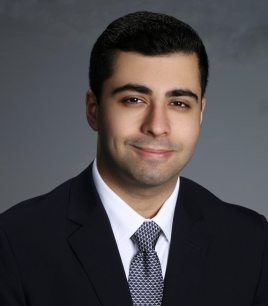 Although it has been a few years since he graduated from the Aga Khan Academy Mombasa, Alqaim Lalani, Class of 2019, says his years at the Academy had a major bearing on his academic career and strongly influenced his outlook on life. Now, as a graduate of Columbia University in New York, Alqaim is giving back to the Aga Khan Academies community that he says shaped his life and gave him so much.
Although it has been a few years since he graduated from the Aga Khan Academy Mombasa, Alqaim Lalani, Class of 2019, says his years at the Academy had a major bearing on his academic career and strongly influenced his outlook on life. Now, as a graduate of Columbia University in New York, Alqaim is giving back to the Aga Khan Academies community that he says shaped his life and gave him so much.
Originally from Tanzania, Alqaim was actively involved in the Academy’s community. As a dorm captain in the residential programme, he learnt time-management skills, maturity and developed strong work ethics. He also gained a passion for positively contributing to his communities, which could be seen in the social enterprise he founded as a student called “Tumaini la Maisha Cancer Initiative”, which supports economically disadvantaged children suffering from cancer to raise money from crafts they make to subsidise their own care. His efforts gained widespread recognition in Tanzania, where he was named one of the ‘Most Influential Young Tanzanians’ for his achievements in social enterprise and philanthropy.
However, upon entering university, Alqaim discovered a new passion: mentoring students during their university application process. Since he began his undergraduate studies in 2019, Alqaim mentored International Baccalaureate Diploma Programme 1 and 2 Academies students, who he believes “are at a very critical stage in their lives,” because they are at the juncture of shifting from school to university.
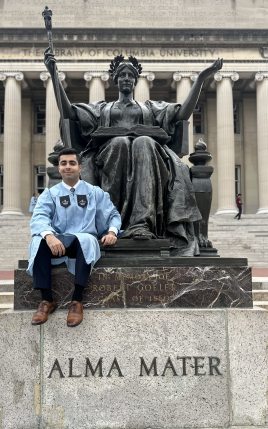 “Transitioning from high school to university can be daunting, given the pressures to choose what you want to study, partake in activities and internships and ultimately determine how you want to start your career – all in the span of a few very consequential years,” Alqaim said.
“Transitioning from high school to university can be daunting, given the pressures to choose what you want to study, partake in activities and internships and ultimately determine how you want to start your career – all in the span of a few very consequential years,” Alqaim said.
Alqaim’s interest in wanting to mentor stems from his own experience at Columbia, where he was introduced to an alumni network and inclusive student community. He soon learnt that Columbia and some other universities actively supported first-year students in selecting courses, applying for campus societies and recruiting for selective careers.
“Even before stepping foot on campus, I was being supported by a community committed to my success, enabling me to transition quite seamlessly once I arrived on campus,” he says.
Alqaim knew he wanted to pay it forward and ensure other students felt this level of support. To date, Alqaim has mentored 11 Academies students from Mombasa and Hyderabad across varying aspects of the university application process. From building a shortlist of institutions that meet their academic and financial needs to approaching standardised tests with confidence and ultimately bringing their authentic self forward when voicing their achievements and background.
One of the students who benefitted from Alqaim’s mentorship is Ayaan Dewani, Class of 2023 from the Aga Khan Academy Hyderabad, who is studying at Boston University with a full-ride scholarship.
"I am incredibly grateful for the invaluable assistance I received from Alqaim during my university application process,” Ayaan said. “His guidance and support were instrumental in helping me navigate the complex and often overwhelming journey toward higher education. He took the time to understand my interests, strengths and aspirations and then provided tailored advice on which universities would be the best fit for me. His insights were spot-on, and he helped me create a well-rounded list of target schools that aligned with my academic and personal goals.”
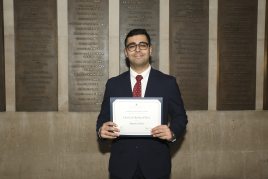 Considering it a privilege to work with students, Alqaim believes he, too, is benefitting from his mentoring.
Considering it a privilege to work with students, Alqaim believes he, too, is benefitting from his mentoring.
“Serving as a mentor has helped improve my leadership skills, exposed me to new perspectives and consolidated lessons I previously learnt,” Alqaim said. “I believe the true value of mentorship lies in eliciting self-reflection and critical thinking from the mentee, rather than simply rearticulating one’s own experience.”
Although he is currently working in financial services, Alqaim continues to support Academies students through this journey by working with them to find internships and jobs that appeal to their talents, and helping them foster the transition from student to working professional by connecting them to other alumni a part of the Aga Khan Academies Alumni Association.
“My experience at the Aga Khan Academy Mombasa has been pivotal in my life,” Alqaim says.
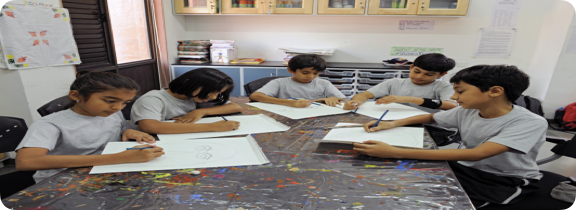
Fee Schedule
Fee schedule for the 2024-2025 academic year.
Click here to download the AKA Dhaka fee schedule for the 2024-2025 academic year.

* Residential facilities will not be available in 2024-2025.
Fees Policy
1) All students are required to pay the Academy fees on a timely basis.
2) On first joining, students must pay the admission fees (non-refundable), tuition fee and caution money deposit (refundable) in advance, prior to attending the Academy, by the designated date.
3) Students are required to pay tuition and transport fees (if eligible) based on the invoice issued through BEFTN or direct deposit at the bank.
4) School bus transport cancellation must be given 2 months prior to the cancellation date. Otherwise, 2 months’ transport fees will be deducted from the deposit.
5) Field trips and any other such off-campus educational experiences which are not included as part of the compulsory curriculum are charged as and when the same is conducted.
6) Exam fees for the Middle Years Programme (MYP) and Diploma Programme (DP) will be billed separately based on the actual fee charged by the International Baccalaureate (IB) and other related and incidental expenses.
7) Payments made after the due date are considered to be late.
8) Late fee payment: Fees not paid by the due date will incur a late fee penalty of 2% per month on the outstanding balance at the end of the month.
9) The Aga Khan Academy Dhaka will send two reminders to the parent, requesting full payment of all fees due (along with late fines if applicable). The parents are responsible for ensuring that the Academy has their updated and functional email address.
10) If the payment is not made within the stipulated time of the first reminder, the following actions will be taken for non-payment:
· Students shall be removed from ManageBac.
· If payment is not received in the next 7 days of the above action, the child shall not be allowed to attend classes.
· If the payment is not received in the next 7 days of the above action, the child will be de-enrolled from the Academy.
11) In the case of a student being de-enrolled or expelled, no fees will be refunded except for the caution money deposit.
12) The Academy retains the right to set off or adjust dues from the caution money deposit or any other amounts the family owes to the Academy.
13) Claims for refund of caution money deposit are to be made in writing, using the required form, within one year of the date of leaving the Academy.
14) The Academy reserves the right to withhold results, school certificates, transfer certificates, transcripts, university referrals or any other information and/or documents if fees or any other dues payable to the Academy are outstanding or not paid in the directed manner.
15) The board of directors of the Aga Khan Education Service, Bangladesh, reserves the right to change these rules anytime if necessary.
16) Student withdrawals and notices:
· The communication of withdrawal by the parent for the beginning of the next academic year must
be sent to the respective school principal's office by 3 March of the due academic year.
· If the communication is received after 31 March, the withdrawing student's full first-term
fee for the next academic year must be paid.
· If the withdrawal is to take place in the middle of the academic year, the Academy requires 90
days' written notice prior to the beginning of the next term.
· If the withdrawal application is not received 90 days before the beginning of the next term
· The communication of withdrawal by the parent for the beginning of the next academic year must be sent to the respective school principal's office by 31 March of the current academic year.
then the following charges shall apply:
(a) 60-89 days before the start of the next term, will be charged 25% of the next term's fees.
(b) 30-59 days before the start of the next term, will be charged 50% of the next term's fees.
(c) Less than 30 days before the start of the next term, will be charged 75% of the next term's fees.
(d) No refund on the next term's fee shall be given after the start of the next term.
(e) The start of the term is defined as the day on which classes begin as per the official calendar shared with the parent.
Please note that any parent making payments through the BEFTN option must send their payment receipt to finance.dhaka@agakhanacademies.org every time they make a payment; otherwise, the Academy will be unable to credit the student’s account.
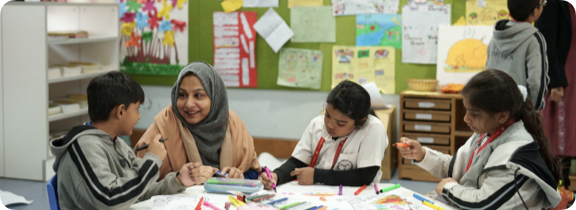
Meet the Staff
Senior leadership team |
|||||
| Head of Academy |
Suvina Shunglu |
||||
|
Principal Senior School |
Fahmida Chowdhury |
||||
|
Principal Junior School |
Shatila Reza |
||||
| Dean of Studies |
Joseph Sydney Hamkari |
||||
| Head of Finance |
Karim Nathu |
||||
| Dean of Admissions |
Paul Davis |
||||
Administration and support services |
|||||
|
Personal Assistant to Head of Academy |
Fariza Sddika | ||||
| Finance Manager |
Abdullah Al Jaber |
||||
| Head of Administration |
Malik Mahemood |
||||
| Facilities and Maintenance Manager |
Kazi Atiqul Haque |
||||
| IT Manager |
Faruk Sikder |
||||
| Head of Human Resources |
Annie Sharmeen |
||||
| Human Resource Specialist |
Ayesha Sirajee Leena |
||||
| Security and Transport Manager |
Mahmudul Hasan |
||||
| Tansport Supervisor |
Mustafizur Rahman |
||||
| Procurement Supervisor |
Delwer Hossain |
||||
| Communications Manager |
Monjure Alahi Haider |
||||
| Admissions Manager |
Momtaz Mumu |
||||
| Food Services Manager |
Mohammad Mainuzzaman |
||||
Junior school faculty |
|||||
| Principal |
Shatila Reza |
||||
| PYP Coordinator |
Tanjina Hossain |
||||
| Early Years Coordinator |
Shahnaz Khan |
||||
| Administration Assistant |
Zohra Virani |
||||
|
Homeroom Teachers |
|||||
| KG1 | Karima Salim Jiwani | ||||
| KG2 | Jannatul Ferdous | ||||
| KG3 | Islama Khandoker | ||||
| Grade 1 |
Fahmida Sharmeen Rahman Kaniz Taskina Trisha |
||||
| Grade 2 |
Shama Ahmad Humayra Rayhana Khan |
||||
| Grade 3 |
Nadia Tazrin Chowdhury Hosna Ara |
||||
| Grade 4 |
Saadiah Shams Shakhawat Tasnim Janan Fatema Bushra |
||||
| Grade 5 |
Farjana Mobin Anjuman Ara Begum Sabina Yasmeen |
||||
|
Teaching Assistants |
|||||
| Junior School |
Nadya Malik Mahemood Sadia Chowdhury Bushra Naziat Islam Shupti Zarmin Samdani Neshma Gilani Afrin Shahid Farhana Afroj Khan Rafa Mahmood Syeda Nafisa Fahrin Sonia Islam NafisaTasneem Mubina Rahman Uzma Perveen Lisa Aafra Fatema Karim Nafisa Nawar Tajim Chakma Md Shakhawat Hossain Noor Salam Kamrul Islam |
||||
|
|
|||||
|
Single Subject Teachers |
|||||
| Art and Craft |
Saiful Hoq Shadal |
||||
| Physical Education |
Tasnuva Haque |
||||
| Music |
Sanchita Saha |
||||
| IT |
Ashraful Alam |
||||
|
Student Learning Support Unit |
|||||
|
Student support coordinator & learning support Lead |
Maliha Afzal |
||||
|
Learning Support Teachers |
Benta Odipo Hilde Napeñas Neculai Pieptu |
||||
Professional Development Centre & Outreach |
|||||
| Head of Professional Development Centre and Outreach |
Md. Musle Uddin Bhuiya |
||||
| Education Officer |
Tozammel Haque |
||||
Senior school faculty
|
|||||
|
Principal Administrative Assistant |
Fahmida Chowdhury Farida Ali |
||||
|
Diploma Programme Coordinator Middle Years Programme Coordinator |
Usha Kasana Ira Srivastav |
||||
|
Theory of Knowledge Coordinator |
Jina Saha |
||||
|
Business Teacher & Supervisor of Sports' CAS and Activities |
Munira Karim |
||||
|
Lead Teacher Performance Art and Personal Project Coordinator |
Vishwajit Shinde |
||||
|
Library Syeda Mukta Begum (Head Librarian) |
|||||
|
Zahura Begum (Junior School Librarian) |
|||||
|
Mir Adiba Awlad (Teacher Librarian) |
|||||
|
Science Ira Srivastav (Lead) |
|||||
|
Anika Tasfia Rodoshi |
|||||
| Abul Fazal M. Shahriar | |||||
| Shahriar Rashid Khan | |||||
|
Rokaiya Ahmed |
|||||
| Ramisa Bushra | |||||
| Salsabil Tabassum Synthia (Physics) | |||||
|
|
|||||
|
English Raja Sen (Lead) |
|||||
| Nusrat Amena Shampa | |||||
| Aziza Choudhury | |||||
| Sultana Nasrin Chowdhury | |||||
| Mohammad Tanvir Amin | |||||
|
Bangla Rokhsana Afroz (Lead) |
|||||
|
Mukta Jasmine |
|||||
|
Mafruha Rahman |
|||||
| Mousumi Islam | |||||
| Shamima Nasrin Shanta | |||||
| Rifat Ara Islam | |||||
|
Mathematics Manasi Biswajeet Mallick (Lead) |
|||||
|
Fatima Momin |
|||||
|
Nazifa Rezwana Haque |
|||||
|
Mohammad Zafar Mahmud |
|||||
|
Shamanta Sharmin Shithi (Theory of Knowledge Coordinator) |
|||||
|
Tabassum Binte Jamal |
|||||
|
|
|||||
|
Expressive Arts (Design) Atia Maqshura (Lead) |
|||||
|
Shammi Akhter Chowdhury (Computer Science and EE Coordinator) |
|||||
|
Syeda Naushin Tabassum |
|||||
|
Fahmida Khatun (Visual Art) |
|||||
|
Md. Shakhawat Hossain Bhuyian (Visual Art) |
|||||
|
Syeda Naushin Tabassum |
|||||
|
|
|||||
|
Humanities Department Jina Saha (Lead) |
|||||
| Kazi Jebun Nesa | |||||
| Momena Farzana Hossain | |||||
| Tasnia Tabassum | |||||
| Mahmuda Akter (Integrated Social Studies) | |||||
| Nabila Islam (Service Learning Coordinator) | |||||
|
Physical Health Education (PHE) Amit Ahire (Lead PHE Teacher and Wellness Coordinator) |
|||||
| Most. Ulfat Zahan | |||||
| Classroom Technology Integration | |||||
| Md. Ramim Ul Haq | |||||
| University Counsellor | |||||
| Nusrat Sharmin | |||||
|
Infirmary Medical Officer: Dr Mahin Hossain |
|||||
|
|
|||||
|
|
|||||
To contact any staff via email, put their first and last name together and separate it with a "." followed by @agakhanacademies.org (ex: john.doe@agakhanacademies.org).
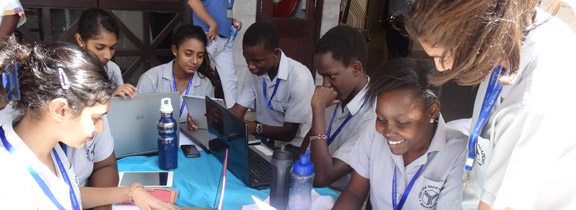
The AKA Learner Profile
The Aga Khan Academies (AKA) have developed a curriculum within the framework of the International Baccalaureate’s (IB) programmes. As such, the attributes of our learner profile are closely aligned to those of the IB learner profile.
Aga Khan Academies learners strive to be:
|
Inquirers |
We nurture our curiosity, developing skills for inquiry and research. We know how to learn independently and with others. We learn with enthusiasm and sustain our love of learning throughout life.
|
|
Knowledgeable
|
We develop and use conceptual understanding, exploring knowledge across a range of disciplines. We engage with issues and ideas that have local and global significance.
|
|
Thinkers |
We use critical and creative thinking skills to analyse and take responsible action on complex problems. We exercise initiative in making reasoned, ethical decisions.
|
|
Communicators
|
We express ourselves confidently and creatively in more than one language and in many ways. We collaborate effectively, listening carefully to the perspectives of other individuals and groups.
|
|
Principled
|
We act with integrity and honesty, with a strong sense of fairness and justice, and with respect for the dignity and rights of people everywhere. We take responsibility for our actions and their consequences.
|
|
Open-minded
|
We critically appreciate our own cultures and personal histories, as well as the values and traditions of others. We seek and evaluate a range of points of view, and we are willing to grow from the experience.
|
|
Caring
|
We show empathy, compassion and respect. We have a commitment to service, and we act to make a positive difference in the lives of others and in the world around us.
|
|
Courageous
|
We approach uncertainty with forethought and determination; we work independently and cooperatively to explore new ideas and innovative strategies. We are resourceful and resilient in the face of challenges and change.
|
|
Balanced |
We understand the importance of balancing different aspects of our lives – intellectual, physical, emotional and spiritual – to achieve well-being for ourselves and others. We recognise our interdependence with other people and with the world in which we live.
|
|
Reflective
|
We thoughtfully consider the world and our own ideas and experience. We work to understand our strengths and weaknesses in order to support our learning and personal development.
|
|
*Leaders |
We understand that multiple perspectives will allow us to make better decisions, and seek opportunities to work with a variety of others. We perceive and anticipate needs and problems, and are able to motivate ourselves and others to tackle problems, confidently and cooperatively.
|
|
*Stewards |
We understand the interconnectedness of communities, striving to create harmony in our environment, while considering the needs of all members. We are motivated to leave the world a better place.
|
© International Baccalaureate 2013
IB learner profile booklet
*Unique attributes of the Aga Khan Academies learner profile
Syeda Sayema Mayesha – tackling global issues through film
Watch Sayema's film "One Sky, Two Souls" below.
Sayema, currently in grade 11, directed and produced an impactful short film to create awareness on child rights for her IB MYP Personal Project towards the end of her IB Middle Years Programme journey. The film was screened in February 2017 at the Academy’s annual ‘innovation expo’.
What caused her to pursue this particular project? “I was inspired to make this film as I have often observed how privileged children do not appreciate what they have, whereas the ones who suffer continue to do so as they are neglected,” Sayema explains. “As a student of the Academy, where children are given the opportunity of holistic education regardless of their financial background, I could not have worked on a better project.”
Sayema is from Bangladesh and studied at the Aga Khan School in Dhaka before joining the Hyderabad Academy in 2014. Her favourite subject is I&S (Individuals and Societies), particularly Economics, because she loves how it engages students and sharpens their perception about the real world. “15 years from now, I see myself completing my higher studies in International Relations and working as a Public Relations Executive. The Academy has influenced this career choice as it has broadened my knowledge and perspective about the world making me enthusiastic to be a leader and play a part in constructive change.”
Soccer is a passion for Sayema, and she has been part of the Academy Senior School girls’ soccer team from the beginning. “It has been a splendid experience for me to play home ground tournaments as well as outside tournaments and win the first ever trophy for the team in Kerala.” Another momentous occasion for her was when she won the ‘Best Delegate Award’ at her first ever Academy Model United Nations in 2015. She is now a passionate MUN participant.
Her knowledge of global issues and her desire to contribute to social change is evident through the film that she made, discussing child rights through the angle of education and labour. “Ensuring child rights today will ensure a brighter future for all tomorrow. The entire process has taught me many aspects of filmmaking. It has taught me to become a leader while working with a team. I have learnt how to deliver stories to the world through my own lens.”
Watch Sayema's film:
Sian Virani – our very own budding Scrabble champion
We wish Sian the best with his Scrabble career!
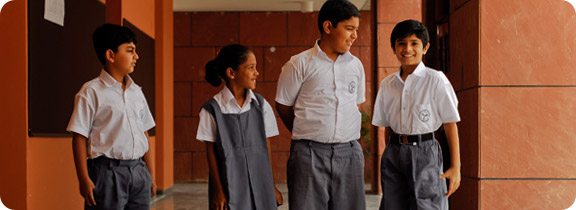
The AKA Learner Profile
The Aga Khan Academies (AKA) have developed a curriculum within the framework of the International Baccalaureate’s (IB) programmes. As such, the attributes of our learner profile are closely aligned to those of the IB learner profile.
Aga Khan Academies learners strive to be:
|
Inquirers |
We nurture our curiosity, developing skills for inquiry and research. We know how to learn independently and with others. We learn with enthusiasm and sustain our love of learning throughout life.
|
|
Knowledgeable
|
We develop and use conceptual understanding, exploring knowledge across a range of disciplines. We engage with issues and ideas that have local and global significance.
|
|
Thinkers |
We use critical and creative thinking skills to analyse and take responsible action on complex problems. We exercise initiative in making reasoned, ethical decisions.
|
|
Communicators
|
We express ourselves confidently and creatively in more than one language and in many ways. We collaborate effectively, listening carefully to the perspectives of other individuals and groups.
|
|
Principled
|
We act with integrity and honesty, with a strong sense of fairness and justice, and with respect for the dignity and rights of people everywhere. We take responsibility for our actions and their consequences.
|
|
Open-minded
|
We critically appreciate our own cultures and personal histories, as well as the values and traditions of others. We seek and evaluate a range of points of view, and we are willing to grow from the experience.
|
|
Caring
|
We show empathy, compassion and respect. We have a commitment to service, and we act to make a positive difference in the lives of others and in the world around us.
|
|
Courageous
|
We approach uncertainty with forethought and determination; we work independently and cooperatively to explore new ideas and innovative strategies. We are resourceful and resilient in the face of challenges and change.
|
|
Balanced |
We understand the importance of balancing different aspects of our lives – intellectual, physical, emotional and spiritual – to achieve well-being for ourselves and others. We recognise our interdependence with other people and with the world in which we live.
|
|
Reflective
|
We thoughtfully consider the world and our own ideas and experience. We work to understand our strengths and weaknesses in order to support our learning and personal development.
|
|
*Leaders |
We understand that multiple perspectives will allow us to make better decisions, and seek opportunities to work with a variety of others. We perceive and anticipate needs and problems, and are able to motivate ourselves and others to tackle problems, confidently and cooperatively.
|
|
*Stewards |
We understand the interconnectedness of communities, striving to create harmony in our environment, while considering the needs of all members. We are motivated to leave the world a better place.
|
© International Baccalaureate 2013
IB learner profile booklet
*Unique attributes of the Aga Khan Academies learner profile

